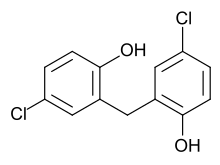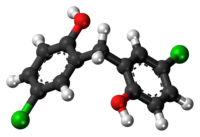Dichlorophen: Difference between revisions
Appearance
Content deleted Content added
amended CSID and InChI(Key)s and PubChem link as these were for an isomer - image needs changing too |
Entranced98 (talk | contribs) Importing Wikidata short description: "Chemical compound" |
||
| (17 intermediate revisions by 14 users not shown) | |||
| Line 1: | Line 1: | ||
{{Short description|Chemical compound}} |
|||
{{unreferenced|date=August 2014}} |
|||
{{Drugbox |
{{Drugbox |
||
| Verifiedfields = changed |
|||
| Watchedfields = changed |
| Watchedfields = changed |
||
| verifiedrevid = 446639999 |
| verifiedrevid = 446639999 |
||
| IUPAC_name = 2 |
| IUPAC_name = 4-Chloro-2-[(5-chloro-2-hydroxyphenyl)methyl]phenol |
||
| image = Dichlorophen. |
| image = Dichlorophen.svg |
||
| image2 = Dichlorophen molecule ball.png |
|||
| width2 = 200 |
|||
| alt2 = Ball-and-stick mode of the dichlorophen molecule |
|||
<!--Clinical data--> |
<!--Clinical data--> |
||
| tradename = |
| tradename = |
||
| Drugs.com = {{drugs.com|international|dichlorophen}} |
| Drugs.com = {{drugs.com|international|dichlorophen}} |
||
| pregnancy_AU = <!-- A / B1 / B2 / B3 / C / D / X --> |
| pregnancy_AU = <!-- A / B1 / B2 / B3 / C / D / X --> |
||
| pregnancy_US = <!-- A / B / C / D / X --> |
| pregnancy_US = <!-- A / B / C / D / X --> |
||
| pregnancy_category = |
| pregnancy_category = |
||
| legal_AU = <!-- S2, S3, S4, S5, S6, S7, S8, S9 or Unscheduled--> |
| legal_AU = <!-- S2, S3, S4, S5, S6, S7, S8, S9 or Unscheduled--> |
||
| legal_CA = <!-- Schedule I, II, III, IV, V, VI, VII, VIII --> |
| legal_CA = <!-- Schedule I, II, III, IV, V, VI, VII, VIII --> |
||
| legal_UK = <!-- GSL, P, POM, CD, or Class A, B, C --> |
| legal_UK = <!-- GSL, P, POM, CD, or Class A, B, C --> |
||
| legal_US = <!-- OTC / Rx-only / Schedule I, II, III, IV, V --> |
| legal_US = <!-- OTC / Rx-only / Schedule I, II, III, IV, V --> |
||
| legal_status = |
| legal_status = |
||
| routes_of_administration = |
| routes_of_administration = |
||
<!--Pharmacokinetic data--> |
<!--Pharmacokinetic data--> |
||
| bioavailability = |
| bioavailability = |
||
| protein_bound = |
| protein_bound = |
||
| metabolism = |
| metabolism = |
||
| elimination_half-life = |
| elimination_half-life = |
||
| excretion = |
| excretion = |
||
<!--Identifiers--> |
<!--Identifiers--> |
||
| CAS_number_Ref = {{cascite|correct|??}} |
|||
| CAS_number = 97-23-4 |
| CAS_number = 97-23-4 |
||
| ATC_prefix = P02 |
| ATC_prefix = P02 |
||
| ATC_suffix = DX02 |
| ATC_suffix = DX02 |
||
| DrugBank_Ref = {{drugbankcite|correct|drugbank}} |
| DrugBank_Ref = {{drugbankcite|correct|drugbank}} |
||
| DrugBank = |
| DrugBank = |
||
| PubChem = 3037 |
| PubChem = 3037 |
||
| ChemSpiderID_Ref = {{chemspidercite|changed|chemspider}} |
|||
| |
| ChemSpiderID = 2929 |
||
| UNII_Ref = {{fdacite|correct|FDA}} |
| UNII_Ref = {{fdacite|correct|FDA}} |
||
| UNII = T1J0JOU64O |
| UNII = T1J0JOU64O |
||
| KEGG_Ref = {{keggcite|correct|kegg}} |
| KEGG_Ref = {{keggcite|correct|kegg}} |
||
| KEGG = C14292 |
| KEGG = C14292 |
||
| ChEMBL_Ref = {{ebicite|changed|EBI}} |
|||
| ChEMBL = 33845 |
|||
<!-- |
|||
| RTECS = SM0175000 |
|||
| EINECS = 202-567-1 |
|||
--> |
|||
<!--Chemical data--> |
<!--Chemical data--> |
||
| C=13 | H=10 | Cl=2 | O=2 |
| C=13 | H=10 | Cl=2 | O=2 |
||
| molecular_weight = 269.12 g/mol |
|||
| smiles = C1=CC(=C(C=C1Cl)CC2=C(C=CC(=C2)Cl)O)O |
| smiles = C1=CC(=C(C=C1Cl)CC2=C(C=CC(=C2)Cl)O)O |
||
| StdInChI_Ref = {{stdinchicite|changed|chemspider}} |
|||
| |
| StdInChI = 1S/C13H10Cl2O2/c14-10-1-3-12(16)8(6-10)5-9-7-11(15)2-4-13(9)17/h1-4,6-7,16-17H,5H2 |
||
| InChIKey = MDNWOSOZYLHTCG-UHFFFAOYAJ |
|||
| StdInChIKey_Ref = {{stdinchicite|changed|chemspider}} |
|||
| StdInChI = 1S/C13H10Cl2O2/c14-10-1-3-12(16)8(6-10)5-9-7-11(15)2-4-13(9)17/h1-4,6-7,16-17H,5H2 |
|||
| |
| StdInChIKey = MDNWOSOZYLHTCG-UHFFFAOYSA-N |
||
| density = 1.5 g/cm<sup>3</sup> |
|||
| melting_point = 177.5 |
|||
| solubility = 0.003 g/100 mL<ref name="hand2">{{cite book | vauthors = Lide DR | year = 1998 | title = Handbook of Chemistry and Physics | edition = 87 | location = Boca Raton, Florida | publisher = CRC Press | isbn = 0-8493-0594-2 | pages = 8–118 }}</ref> |
|||
<!-- |
|||
| SolubleOther = 53 g/100 mL in [[ethanol]], 80 g/100 mL in [[acetone]]<ref name="hand">{{cite book | vauthors = Lide DR | year = 1998 | title = Handbook of Chemistry and Physics | edition = 87 | location = Boca Raton, Florida | publisher = CRC Press | isbn = 0-8493-0594-2 | pages = 3–174 }}</ref> |
|||
| LD50 = 1000 mg/kg (mouse, oral)<ref name="gard"/> |
|||
--> |
|||
}} |
}} |
||
'''Dichlorophen''' is an [[anticestodal agent]], fungicide, germicide, and antimicrobial agent.<ref name="gard">Milne, G.W.A. (Ed.). (2005). ''Gardner's commercially important chemicals: Synonyms, trade names, and properties.'' Hoboken, N.J.: Wiley-Interscience. [https://books.google.com/books?id=oWdc2qcb3QsC&pg=PA201 Google Books]</ref> It is used in combination with [[toluene]] for the removal of [[parasite]]s such as [[ascarid]]s, [[hookworm]]s, and [[tapeworm]]s from [[dog]]s and [[cat]]s.<ref name="cfr">{{Citation | title=Code of Federal Regulations | url= http://frwebgate1.access.gpo.gov/cgi-bin/TEXTgate.cgi?WAISdocID=220114194717+2+1+0&WAISaction=retrieve| work= Code of Federal Regulations, Title 21, Volume 6| publisher=U.S. Government Printing Office | date= 2005-04-01| access-date=2009-05-01}}</ref> |
|||
'''Dichlorophen''' is an [[anticestodal agent]]. |
|||
==Safety and regulation== |
|||
[[LD50]] (oral, mouse) is 3300 mg/kg.<ref name="a">{{Ullmann| vauthors = Fiege H, Voges HW, Hamamoto T, Umemura S, Iwata T, Miki H, Fujita Y, Buysch HJ, Garbe D, Paulus W | contribution=Phenol Derivatives | year=2007 | doi=10.1002/14356007.a19_313}}</ref> |
|||
==References== |
==References== |
||
{{reflist}} |
{{reflist}} |
||
| Line 57: | Line 77: | ||
[[Category:Antiparasitic agents]] |
[[Category:Antiparasitic agents]] |
||
[[Category: |
[[Category:Chloroarenes]] |
||
[[Category:Phenols]] |
[[Category:Phenols]] |
||
[[Category:Veterinary drugs]] |
|||
{{antiinfective-drug-stub}} |
{{antiinfective-drug-stub}} |
||
Latest revision as of 00:51, 29 January 2023
 | |
 | |
| Clinical data | |
|---|---|
| AHFS/Drugs.com | International Drug Names |
| ATC code | |
| Identifiers | |
| |
| CAS Number | |
| PubChem CID | |
| ChemSpider | |
| UNII | |
| KEGG | |
| ChEMBL | |
| CompTox Dashboard (EPA) | |
| ECHA InfoCard | 100.002.335 |
| Chemical and physical data | |
| Formula | C13H10Cl2O2 |
| Molar mass | 269.12 g·mol−1 |
| 3D model (JSmol) | |
| Density | 1.5 g/cm3 g/cm3 |
| Melting point | 177.5 °C (351.5 °F) |
| Solubility in water | 0.003 g/100 mL[1] mg/mL (20 °C) |
| |
| |
| | |
Dichlorophen is an anticestodal agent, fungicide, germicide, and antimicrobial agent.[2] It is used in combination with toluene for the removal of parasites such as ascarids, hookworms, and tapeworms from dogs and cats.[3]
Safety and regulation
[edit]LD50 (oral, mouse) is 3300 mg/kg.[4]
References
[edit]- ^ Lide DR (1998). Handbook of Chemistry and Physics (87 ed.). Boca Raton, Florida: CRC Press. pp. 8–118. ISBN 0-8493-0594-2.
- ^ Milne, G.W.A. (Ed.). (2005). Gardner's commercially important chemicals: Synonyms, trade names, and properties. Hoboken, N.J.: Wiley-Interscience. Google Books
- ^ "Code of Federal Regulations", Code of Federal Regulations, Title 21, Volume 6, U.S. Government Printing Office, 2005-04-01, retrieved 2009-05-01
- ^ Fiege H, Voges HW, Hamamoto T, Umemura S, Iwata T, Miki H, Fujita Y, Buysch HJ, Garbe D, Paulus W (2007). "Phenol Derivatives". Ullmann's Encyclopedia of Industrial Chemistry. Weinheim: Wiley-VCH. doi:10.1002/14356007.a19_313. ISBN 978-3527306732.
